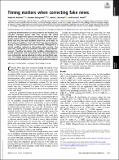| dc.contributor.author | Brashier, Nadia M. | |
| dc.contributor.author | Pennycook, Gordon | |
| dc.contributor.author | Berinsky, Adam | |
| dc.contributor.author | Rand, David Gertler | |
| dc.date.accessioned | 2022-01-12T13:51:00Z | |
| dc.date.available | 2021-10-15T20:01:54Z | |
| dc.date.available | 2022-01-12T13:51:00Z | |
| dc.date.issued | 2021-01 | |
| dc.identifier.issn | 0027-8424 | |
| dc.identifier.issn | 1091-6490 | |
| dc.identifier.uri | https://hdl.handle.net/1721.1/133011.2 | |
| dc.description.abstract | © 2021 National Academy of Sciences. All rights reserved. Countering misinformation can reduce belief in the moment, but corrective messages quickly fade from memory. We tested whether the longer-term impact of fact-checks depends on when people receive them. In two experiments (total N = 2,683), participants read true and false headlines taken from social media. In the treatment conditions, “true” and “false” tags appeared before, during, or after participants read each headline. Participants in a control condition received no information about veracity. One week later, participants in all conditions rated the same headlines’ accuracy. Providing fact-checks after headlines (debunking) improved subsequent truth discernment more than providing the same information during (labeling) or before (prebunking) exposure. This finding informs the cognitive science of belief revision and has practical implications for social media platform designers. | en_US |
| dc.language.iso | en | |
| dc.publisher | Proceedings of the National Academy of Sciences | en_US |
| dc.relation.isversionof | http://dx.doi.org/10.1073/pnas.2020043118 | en_US |
| dc.rights | Article is made available in accordance with the publisher's policy and may be subject to US copyright law. Please refer to the publisher's site for terms of use. | en_US |
| dc.source | PNAS | en_US |
| dc.title | Timing matters when correcting fake news | en_US |
| dc.type | Article | en_US |
| dc.identifier.citation | Brashier, Nadia M., Pennycook, Gordon, Berinsky, Adam and Rand, David Gertler. 2021. "Timing matters when correcting fake news." Proceedings of the National Academy of Sciences of the United States of America, 118 (5). | en_US |
| dc.contributor.department | Massachusetts Institute of Technology. Department of Political Science | en_US |
| dc.contributor.department | Massachusetts Institute of Technology. Department of Brain and Cognitive Sciences | en_US |
| dc.relation.journal | Proceedings of the National Academy of Sciences of the United States of America | en_US |
| dc.eprint.version | Final published version | en_US |
| dc.type.uri | http://purl.org/eprint/type/JournalArticle | en_US |
| eprint.status | http://purl.org/eprint/status/PeerReviewed | en_US |
| dc.date.updated | 2021-03-12T14:52:25Z | |
| dspace.orderedauthors | Brashier, NM; Pennycook, G; Berinsky, AJ; Rand, DG | en_US |
| dspace.date.submission | 2021-03-12T14:52:26Z | |
| mit.journal.volume | 118 | en_US |
| mit.journal.issue | 5 | en_US |
| mit.license | PUBLISHER_POLICY | |
| mit.metadata.status | Publication Information Needed | en_US |
